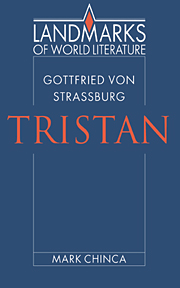Introduction
Published online by Cambridge University Press: 05 June 2012
Summary
‘O everlasting night, sweet night, sacred, exalted night of love! He who has felt your embrace and your smile, how could he ever awake from you without pangs of dread?’ Thus sing Wagner's lovers Tristan and Isolde. Their ‘Liebesnacht’, the night of love, becomes the ‘Liebestod’ in the continuation of their duet: ‘Banish now those pangs, gentle death, love-death of our ardent longing! In your arms, consecrated to you, hallowed warmth of ages, we are free from awaking's duress!’ (Tristan und Isolde, ed. W. Zentner, Stuttgart, 1950, act II, scene 2). Night and death are the fulfilment of love. Nothing could be further from the medieval source on which Wagner freely based his story-line, the Middle High German verse romance Tristan, written around 1210 by Gottfried von Strassburg; nor is it anything like the source that Gottfried used, the Old French Roman de Tristan by Thomas. In the medieval versions, there is nothing metaphysical about the lovers' death. Thomas leaves them side by side on the bier, summing up tersely, ‘Tristran died for his love, and fair Ysolt of a tender heart’ (ed. Wind, Sneyd, 818–19). The scene is not included in Gottfried's unfinished romance, but he does narrate the death of Tristan's parents, Riwalin and Blanscheflur. The father dies, not for love, but in a feudal war he incautiously provoked with his neighbour; the mother does not survive her grief.
- Type
- Chapter
- Information
- Gottfried von Strassburg: Tristan , pp. 1 - 2Publisher: Cambridge University PressPrint publication year: 1997



